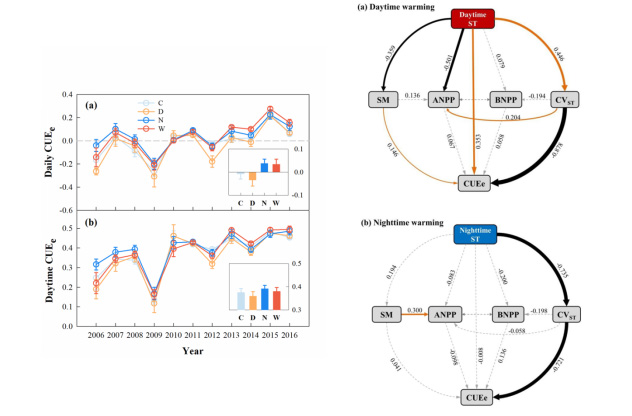On April 29, the research results of Professor Wan Shiqiang's team in the field of global change and carbon cycle were published online in Functional Ecology with the title "Nighttime warming enhances ecosystem carbon-use efficiency in a temperate steppe". The first author of the research paper is Wang Jing, a young teacher of the Global Change Ecology Laboratory, and the corresponding author is Professor Wan Shiqiang. Hebei University is the first unit and communication unit of this paper. Functional Ecology is an international mainstream journal of ecology (JCR Region 1 Top, 2018 impact factor 5.037, five-year impact factor 5.827).
Since the industrial revolution, the impact of human activities has led to the intensification of global warming, and the rise of diurnal and night temperature has shown significant asymmetry, that is, the increase of the minimum temperature at night is significantly higher than the increase of the maximum temperature during the day. Previous studies on the impact of climate warming on the carbon cycle of ecosystems have mainly focused on the impact of daily average temperature rise, and it is still unknown whether the impact of daytime and nighttime warming on the carbon cycle is different, and whether the effect of climate warming is mainly driven by daytime or nighttime temperature rise. In this study, the responses of different levels of carbon use efficiency to diurnal asymmetric warming in ecosystems were explored by simulating day, night and all-day warming experiments in typical semi-arid grasslands in Inner Mongolia, China for 11 consecutive years. The results showed that nocturnal warming had no effect on the carbon use efficiency at the plant canopy level, but significantly improved the ecosystem carbon use efficiency, mainly because the nighttime warming reduced the temporal and nighttime temperature variability, reduced ecosystem respiration and improved the ecosystem carbon use efficiency, while daytime warming had no effect on the carbon use efficiency of plant canopy and ecosystem level. This study shows that there are significant differential effects of daytime and nighttime temperature rise on the ecosystem carbon cycle, and the impact of all-day warming is mainly driven by nighttime warming. Under the trend of faster nighttime minimum temperature rise in the future, grassland ecosystems may further enhance their carbon sink function by improving the carbon use efficiency of ecosystems. (Link to paper: https://doi.org/10.1111/1365-2435.13579.))

Effects of daytime and nighttime warming on carbon use efficiency of grassland ecosystems and potential process mechanisms
In addition, Dr. Wang Jing also published a research paper entitled "Long-term deepened snow cover alters litter layer turnover rate in temperate steppes" online in the same journal as the first author on January 22 this year. Through the transect survey and data analysis conducted in Inner Mongolia for three consecutive years, this study found that the increase of winter snow depth had no effect on the retention and turnover of the litter layer in typical grassland, but it would significantly increase the litter layer retention time of meadow steppe, mainly because the increase of snow depth changed the species composition of plant communities, increased grass and reduced the relative proportion of weeds, which increased the refractory degradation of litter layer at the community level and decreased the decomposition rate. The results show that the turnover rate and retention time of the meadow steppe litter layer may change under the future winter snowfall change scenario, which will further affect important ecological processes such as species renewal and species diversity maintenance in the region. The corresponding author of the paper is Liu Lingli, a researcher at the Institute of Botany, Chinese Academy of Sciences, and Hebei University is the second completion unit. (Paper link: https://doi.org/10.1111/1365-2435.13531)
In recent years, Professor Wan's team has published more than 150 papers in top international and mainstream journals such as Nature Geoscience, Ecology Letters, Global Change Biology, New Phytologist, etc., focusing on the response of terrestrial ecosystem carbon cycle to climate change and its feedback, and has been cited more than 9200 times. Professor Wan Shiqiang currently has an H-index of 49 and has been selected as one of the "Highly Cited Scholars in China" in the field of environmental science by the internationally renowned publishing group "Elsevier" for six consecutive years (2014-2019), which has significantly enhanced the international influence of Chinese ecology. Professor Wan Shiqiang was selected into the "Hundred Talents Program" of the Chinese Academy of Sciences in 2005, the National Outstanding Youth Fund in 2009, the "Changjiang Scholars Award Program" of the Ministry of Education in 2011, and the first batch of "10,000 Talents Program" scientific and technological innovation leading talents in 2014. (For details, see Baidu entry: Wan Shiqiang)


